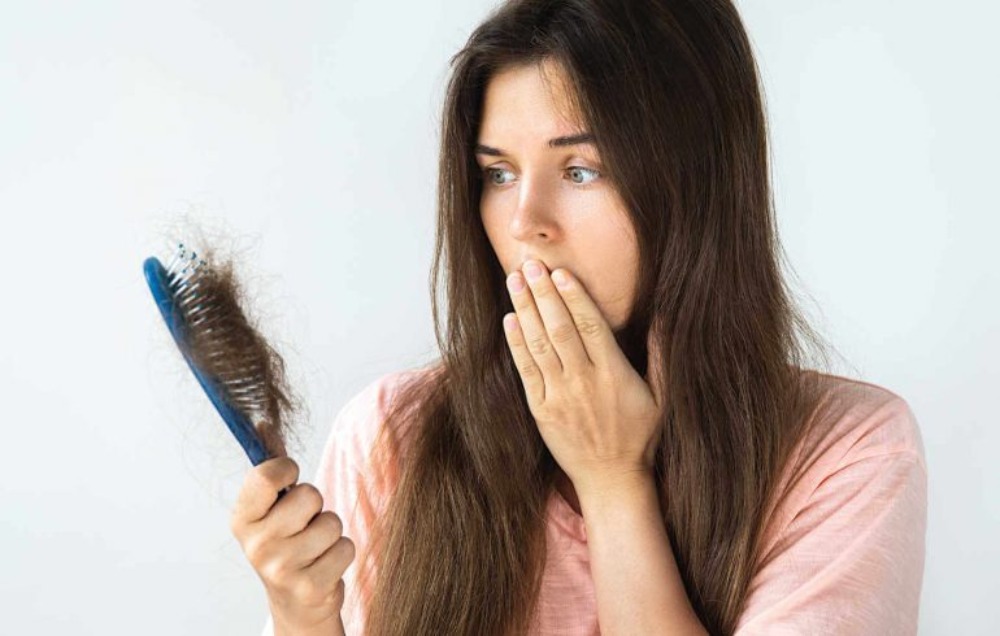Winter Hair Loss: With the arrival of winter, it’s not unexpected that you’re shedding more hair in the shower than usual. Just as your skin’s health changes with the seasons, so makes the hair loss you’re likely to experience throughout the winter. Excessive hair loss in the winter is mainly caused by the dry air outside, which sucks away all moisture from your scalp and causes it to become dehydrated. A dry scalp leads to dry hair, which leads to hair damage, breakage, and loss. Dandruff is caused by a dry scalp, making your head itchy and unpleasant. This, along with dry air, can result in substantial hair loss in the winter.
Table of Contents
Massages With Oils
In the winter, nothing beats a thorough scalp massage for your hair, which improves blood circulation to the scalp, strengthening the hair follicles from the inside out.
Warm 2-3 teaspoons of olive or almond oil and massage it into the scalp slowly to go deep into the hair roots. You may also apply the oil to the length of your hair for deep conditioning. Oil massages are a terrific method to feed your hair and scalp with the vitamins they need to withstand the winter winds, in addition to being highly relaxing. Massaging your hair with oil regularly is crucial for maintaining its strength and luster, as well as improving blood circulation and providing nutrients to your hair cuticles. Vitamin B12 encourages healthy hair development, so keep an eye on your levels.
To get rid of dandruff, combine a little oil with a bit of camphor and apply it to your scalp. Camphor is an antimicrobial that aids in decreasing scalp dryness and itching.
Determine The Source Of Hair Loss
Simple everyday activities might contribute to your winter-related hair loss, from stress to dietary inadequacies. Consult a hair specialist (trichologist) to maintain your strands shiny and healthy, consult a hair specialist (trichologist). Your doctor may suggest specific health tests to help you better understand your health statistics and blood parameters. A complete blood profile can assist your doctor in ruling out systemic disorders that could be causing your hair and scalp’s state.
Eat Well And Drink Plenty Of Water

Hair loss can be caused by poor diets deficient in vital vitamins, minerals, and other hair nutrients. Vitamin A increases healthy sebum production in the scalp, vitamin E stimulates blood circulation to keep hair follicles active, and vitamin B aids in hair health maintenance. A poor diet and nutritional deficits hamper your body’s capacity to develop new hair follicles. Make sure you get enough green foods and protein in the colder months. Hair growth and hair loss are aided by eating lean meats, curd, seafood, soy, and other proteins
Also Read: How to Do Feet Pedicure at Home
Use Hair Product That Is Appropriate For Your Hair Type
Hair oils, shampoos, conditioners, and hair masks are among the many hair products you use. Preventing hair loss begins with select the best hair product for your specific needs. For model, if you have dry hair, use products that provide deep conditioning.
Conditioning with a conditioner is an essential phase in the hair care process that is sometimes overlooked. In fact, in the winter, it is the most critical step. Conditioning your hair’s outermost layer, the cuticle, makes it seem healthy and lustrous. Conditioning after each wash ensures that the cuticle fulfills its function as the protective layer it was designed to be. When shopping, search for a conditioner that contains cetyl alcohol, which is a beautiful hydrating ingredient.
A deep conditioning hair mask, on the other hand, is an excellent technique to keep your hair moisturized and prevent it from getting dull and lifeless. Natural homemade hair packs for winter hair care may use once or twice a week to offer you lustrous hair.
To begin with hair care at home, combine mashed banana and an egg in a mixing bowl and thoroughly mix to produce a paste. Blend in a blender with a few drops of lemon and a Vitamin E pill until smooth. Apply this fix to your hair from the roots to the tips and leave it on for 30 actions before rinsing it off with a moderate shampoo.
You may also use a natural aloe vera gel and combine it with a few drops of lemon liquid and a spoonful of olive or coconut oil. Apply the mixture evenly from the roots to the tips of your hair. Allow 30 minutes to pass. Rinse your hair with a light shampoo and cold (ideally) or lukewarm water.
Showering In A Hot Tub Is Not Recommended
Avoid taking long hot showers or using hot water to wash your hair. Hair will damage too much heat. Instead, while have a head bath, use lukewarm water.
Limit your usage of curling irons and puff dryers as well. The less you use these heat styling tackle, the better it will be for your hair. Use a hair guard spray before experimenting if you style your hair frequently.
Also Read: What Is Solid Shampoo, How Do I Use It?

